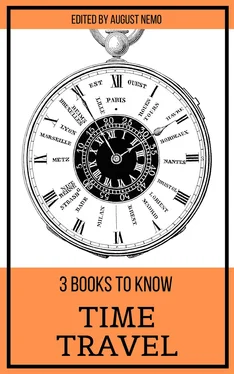BY PIETER HARTING
––––––––

WHEN COMPARING THE present condition of society with that of past centuries the question naturally arises, what will the future be?
Will the same progress which, in our own times especially, has been of such vast dimensions, and manifested itself in so many directions, continue to be progressive? And if so—for who could think of reaction, since the art of printing has guarded against any furrow of the human mind being ever effaced—where is to be the ultimate goal of the progress of our successors? Where are we to look for the fruits of those innumerable germs which the present generation is sowing for the benefit of those that will come after them?
These, and similar other questions, occupied my mind when, seated one afternoon in my comfortable arm-chair, I allowed my thoughts freely to wander amid the manes of those that preceded us. I thought of our own Musschenbroek, Gravesande, Huyghens, and Stevin, and of what would be their surprise were they to reappear on this earth, and gaze upon the marvellous works of modern machinery; I passed in review a Newton and Galileo, with so many others, founders of an edifice which they themselves would not now recognise. I thought of steam engines and electric telegraphs, of railways and steamboats, of mountain tunnels and suspension bridges, of photography and gasworks, of the amazing strides lately made by chemistry, of telescopes and microscopes, of diving bells and aëronautics; aye, and of a hundred other things, which, in motley array, wildly crossed my mind, though all corresponding in this that they loudly proclaimed the vast and enormous difference between the present and the past. The line of demarcation between the one and the other revealed itself still more clearly to me as my thoughts carried me further back into the past and the ghost of Roger Bacon seemed to rise before my imagination. This thirteenth-century child was a scholar who surpassed all his contemporaries in sound judgment and knowledge of natural science; alas! his fate was the ordinary one in store for all those whose light shone above that of others in those darkest of ages. He was accused of witchcraft, and cast into a dungeon, there doomed to sigh for ten weary years, after which, as the rumour goes, he died in his prison. The memory of that illustrious man called to my mind some passages of his writings, from which it will be seen how he, as if endowed with the seer’s gift, did actually foretell, some six hundred years ago, that which since, and chiefly in our own time, has become an array of realities. For example:
“It is possible,” says he, “to construct spying-glasses by which the most distant objects can be drawn near to us, so that we shall be able to read the most minute writing at an almost incredible distance, to see all kinds of diminutive objects, and to make the stars appear wherever we choose.”
“We might make waggons that could move along with great velocity, and without being drawn by animals.”
“Similar other machines might be had, as, for example, bridges without pillars or supports of any kind.”
“There might be contrivances for the purpose of navigation without navigators, so that the greatest vessels would be handled by one single man, and at the same time move onward with greater speed than those with numerous crews.”
As I pondered over such remarkable observations as those, I sank into absolute reverie; all surrounding objects seemed gradually to disappear from my sight, until I got into that peculiar condition in which, while everything material about us is at rest and passive, the mind, on the contrary, proves uncommonly active and alert.
I felt myself suddenly in the midst of an immense city; where I did not know, but about me I saw a vast square, and in it a stately edifice with a lofty tower, on which I fancied I read the following inscription:
A.D. 2071.
January 1st.
I could scarcely believe my own eyes, and must have approached the tower with looks highly expressive of curiosity and amazement; for an elderly gentleman, accompanied by a young lady, stepped forward to speak to me. “I see, sir, that you are a stranger in Londinia; if any information could be of service to you——”
These kind words caused me to stop; I looked at the man who stood before me, and was at once struck and impressed by his thoughtful and noble features. Nor was I slow in recognising him. He was the very man with whom I had been for some time past engaged in my thoughts.
“You are Roger Bacon,” said I.
“To be sure!” was his reply; “at the same time allow me the pleasure of introducing you to this young lady friend of mine, Miss Phantasia.”
I happened to be in that frame of mind to which one might apply the Horatian nil mirari. Nothing of what I saw surprised me, not even the appearance in the flesh of a man like Bacon, who had taken his departure from our planet some five hundred years ago. I therefore simply accepted his obliging offer, and began by asking for an explanation of the figures and words on the tower.
“On yonder tower, over the clock-face?” answered he. “Why, that means simply this, that we have arrived at the first day of the new year 2071.”
“But what is the time? I see so many hands and figures on the clock, that I am perfectly bewildered.”
“What kind of time is it you want to know?” asked he in reply; “true, mean, or
––––––––

FOR EACH OF THESE HAS its own set of hands and figures.”
“I know full well,” said I, “what true time is, also what is understood by mean time, but what on earth is meant by aleutic time?”
“I will soon explain,” spoke my obliging guide. “Since the whole globe has been encircled by one large net of telegraph lines, and wire messages, whether east or westward bound, do the whole round of our planet in a single moment, it has been found necessary to adopt a kind of time that would apply to any spot of the earth; for by some such contrivance alone was it possible to avoid a confusion that would have been fatal in many cases, more especially in those of commercial transactions, when the knowledge of the right time is an object of no mean consideration. By mutual agreement the several nations therefore selected the largest of the Aleutic islands, by way of a neutral point or centre. When the sun rises on the east coast of that island, then begins the world-day. Nor has the selection of the neutral point been in any way an arbitrary one; for east and west of the meridian which passes over that island are to be found those very latitudes where the confusion of time was formerly at its height; and for this reason, that according to their discovery having been accomplished either from Europe in easterly direction round Africa, or westward round America, one whole day had been lost or gained. Now the consequence of this was, that in the islands of these latitudes the inhabitants of the eastern coasts and those dwelling in the west differed four-and-twenty hours in their calculations of time, owing to the circumstance that they belonged to, or were descended from, the one or the other ancient colony. The adoption of an Aleutic time has put a stop to any such confusion.”
Having thus endeavoured to satisfy my curiosity, my companion went on to say: “Do come along with us; we shall have plenty of opportunity to show you other matters of interest in the city of Londinia.”
Читать дальше













